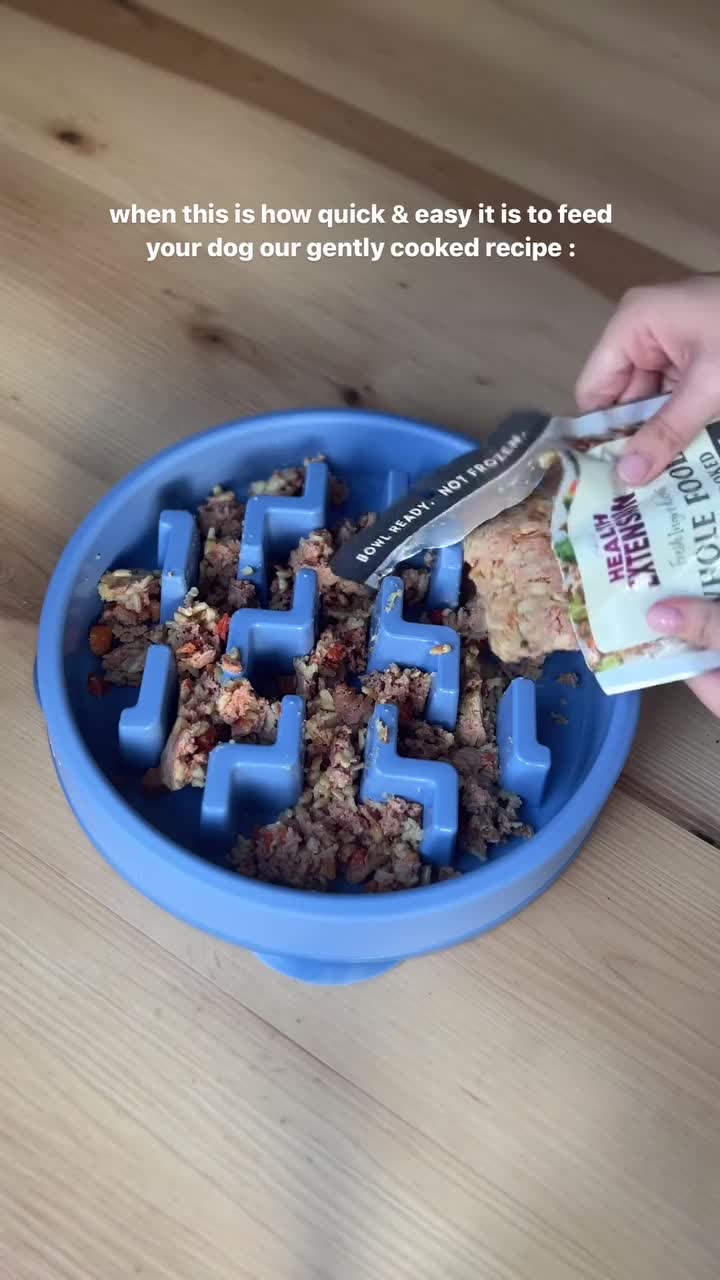Introducing Health Extension Gently Cooked, a revolutionary line of fresh, bowl-ready meals designed to delight dogs with the taste of homemade food, minus the preparation hassle. Each recipe features a high-quality protein source, such as lamb, beef, salmon, duck, or chicken, as the primary ingredient. These protein-rich foundations are complemented by a vibrant mix of fresh vegetables like carrots, sweet potatoes, and broccoli, along with a potent blend of superfoods. These include bone broth, goji berry, turmeric, kelp, sage, thyme, and coconut oil, all working synergistically to support your dog’s overall health and vitality.
The Convenience of Fresh, Shelf-Stable Nutrition
Health Extension Gently Cooked eliminates the need for crowded freezers or refrigerators. Say goodbye to thawing times and lengthy preparations. These meals are ready to serve whenever you are, offering a convenient way to provide your dog with fresh, whole foods. Each meal is slow-cooked in small batches and is shelf-stable, meaning no artificial preservatives are needed to maintain freshness and nutritional integrity. Formulated by veterinarians, Health Extension Gently Cooked offers a complete and balanced diet suitable for dogs of all ages and sizes.
Fueling a Longer, Happier Life
The carefully selected superfoods in Health Extension Gently Cooked are chosen for their specific health-boosting properties. These ingredients contribute to a happy belly, promote healthy skin and a shiny coat, strengthen the immune system, support a healthy heart, and contribute to the development of powerful muscles, joints, and bones. This functional nutrition is science-backed and veterinarian-formulated to address your dog’s unique needs at every stage of life. From supporting strong joints and healthy digestion to enhancing vibrant energy, every recipe is crafted with purposeful ingredients that deliver tangible benefits, promoting a longer, healthier, and happier life for your beloved pet.
Irresistible Taste for Even the Pickiest Eaters
Health Extension Gently Cooked meals are made with human-grade ingredients, ensuring a flavor and aroma that even the most discerning dogs find irresistible. The gentle cooking process locks in the natural tastes and smells of real, recognizable foods, transforming mealtime into an event your pup will eagerly anticipate. This focus on palatability makes it an ideal solution for picky eaters, ensuring they receive the complete and balanced nutrition they need.
A Legacy of Caring for Your Pets
With a history spanning three generations and over 60 years, Health Extension began in New York with a commitment to small-batch production and a pet-first philosophy. This enduring promise continues to guide the brand today, ensuring that every product reflects a deep understanding of pet nutrition and well-being. Health Extension Gently Cooked embodies this legacy, providing a trustworthy and wholesome food option for your canine family members.
Key Features and Benefits at a Glance:
- Boosts Health with Superfoods: Supports digestion, skin, coat, immunity, heart health, muscles, joints, and bones.
- No Refrigeration or Preservatives: Shelf-stable meals are gently slow-cooked in the pouch, preserving nutrients and flavor.
- Veterinarian-Formulated: Science-backed nutrition tailored for all life stages.
- Perfect for Picky Eaters: Human-grade ingredients with irresistible taste and aroma.
- Convenient and Easy to Serve: No thawing, prepping, or refrigeration required. Just open and serve.
Ingredients: Chicken, Carrot, Pumpkin, Brown Rice, Green Pea, Chicken Bone Broth, Salt, Inulin, Sunflower Oil, Tricalcium Phosphate, Iron Proteinate, Copper Proteinate, Zinc Proteinate, Manganese Proteinate, Vitamins (Vitamin C Supplement, Thiamine Mononitrate, Vitamin E Supplement, Niacin Supplement, Vitamin A Supplement, Pantothenic Acid, Vitamin D3 Supplement, Riboflavin Supplement, Choline Chloride, Pyridoxine Hydrochloride, Folic Acid, Biotin, Vitamin B12 Supplement), Potassium Chloride, Magnesium Sulfate, Sage, Thyme, Rosemary, Goji Berry, Coconut Oil, Kelp Powder, Turmeric, Selenium Yeast, Potassium Iodide.
Caloric Content: 1500 kcal/KG, 383 Kcal per 9oz Pouch.
Guaranteed Analysis: Crude Protein (min) 10.0%, Crude Fat (min) 5.0%, Crude Fiber (max) 3.0%, Moisture (max) 78.0%.
Health Extension Gently Cooked offers a simple, healthy, and delicious way to nourish your dog. By prioritizing high-quality ingredients and expert formulation, these meals contribute to a vibrant and energetic life for your canine companion. Make the switch to Health Extension Gently Cooked and experience the difference that fresh, wholesome nutrition can make.

